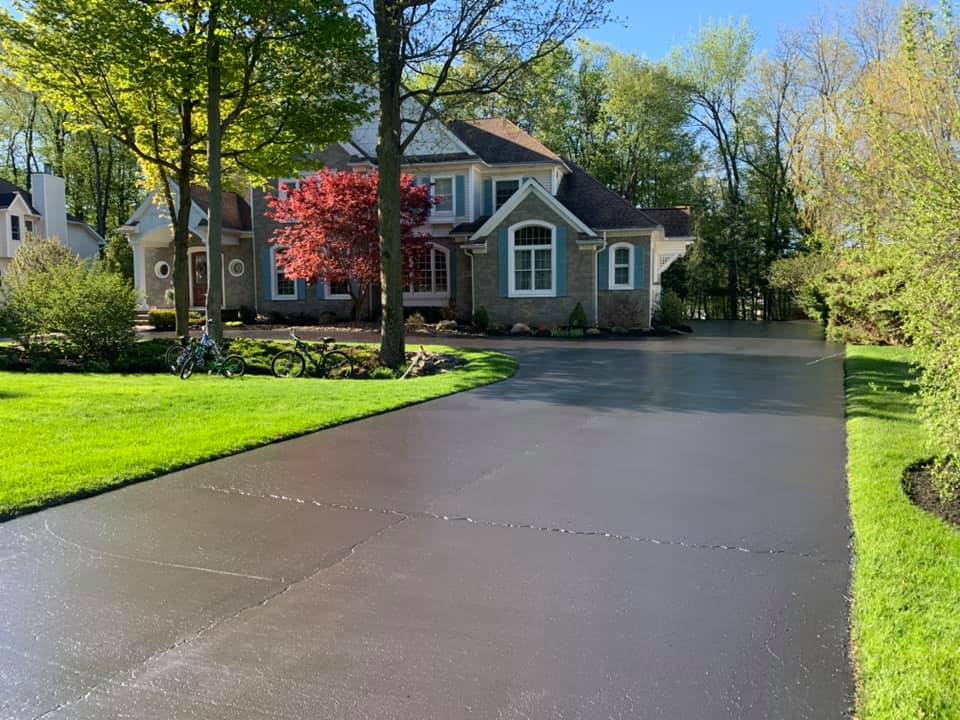Seal in High Quality: Professional Solutions for Asphalt Repair and Sealing
Seal in High Quality: Professional Solutions for Asphalt Repair and Sealing
Blog Article
Cold Mix Asphalt Vs. Hot Mix Asphalt: Which Is Right for You?

Make-up Distinctions
Cold mix and warm mix asphalts vary dramatically in their composition, with distinctive qualities that influence their efficiency and applications. Cold mix asphalt is generated by emulsifying the asphalt binder with water and an emulsifying agent before blending it with accumulation. This approach permits the asphalt to be workable at reduced temperature levels, making it ideal for temporary repair services and for usage in cooler weather condition conditions. Hot mix asphalt, on the other hand, is made at high temperature levels, usually in between 300-350 ° F, which aids to attain better compaction and an extra durable last item. The hot mix asphalt manufacturing procedure entails heating up the aggregate and asphalt binder individually before combining them at the asphalt plant.
Furthermore, chilly mix asphalt tends to be much less thick and a lot more versatile than warm mix asphalt. This versatility makes it better fit for areas with higher degrees of movement, such as driveways or roadways with rush hour. On the other hand, hot mix asphalt is understood for its high resilience and resistance to rutting and cracking, making it a favored choice for highways and high-traffic roads where durability is critical.
Installation Process Variances
The procedure of installing cold mix and hot mix asphalt shows notable differences in their requirements and procedures. In contrast, hot mix asphalt necessitates an extra elaborate setup process. Due to the home heating requirements, hot mix asphalt installments are typically carried out by professionals with specific tools, making sure an extra structurally sound and irreversible outcome.
Sturdiness and Long Life Variables
When considering asphalt options, durability and long life are vital aspects to evaluate for enduring pavement efficiency. Warm mix asphalt (HMA) is known for its outstanding longevity and durability.
In terms of longevity, HMA usually outshines CMA because of its exceptional stamina and resistance properties. HMA sidewalks have a longer solution life, needing much less constant fixings and maintenance, which can equate to cost financial savings in the future. Additionally, HMA pavements are more easily personalized to fulfill details job demands, further boosting their sturdiness.
Cost Factors To Consider
Thinking about the monetary implications is a crucial facet when evaluating the choice between warm mix asphalt (HMA) and chilly mix asphalt (CMA) for pavement tasks. While the preliminary expense of warm mix asphalt is commonly greater than that of cool mix asphalt, HMA commonly offers an extra cost-effective service over time due to its superior resilience and longevity. HMA is known for its capacity to endure heavy traffic lots and harsh weather condition conditions, reducing the requirement for frequent repairs and upkeep. On the various other hand, cool mix asphalt is more affordable ahead of time but might need even more constant patching and resurfacing, resulting in greater upkeep costs gradually.
Along with material costs, it's important to think about the expenditures connected with installment and upkeep when comparing HMA and CMA. HMA normally calls for customized devices and knowledgeable labor for correct installment, which can affect overall task expenses. Conversely, CMA is easier to function with and can commonly be used using less complex methods, possibly reducing setup expenses. Inevitably, the decision in between HMA and CMA ought to think about not simply the initial price but also the long-term economic ramifications to establish one of the most affordable option for the certain pavement task.
Environmental Influence Comparison
Comparison of the environmental impacts in between warm mix asphalt (HMA) and cold mix asphalt (CMA) exposes distinctive distinctions in sustainability practices. HMA production needs high temperature levels, leading to raised energy usage and greenhouse gas exhausts. The procedure also launches volatile organic compounds (VOCs) and dangerous air contaminants (HAPs) into the environment. In comparison, CMA is generated and used at reduced temperatures, minimizing power use and exhausts dramatically. The reduced production temperatures of CMA result in decreased fuel intake and reduced degrees of carbon dioxide exhausts, making it an extra eco-friendly Homepage choice.
Additionally, the visit here usage of CMA commonly includes reusing existing asphalt pavement, promoting source conservation and lowering the quantity of waste sent to garbage dumps. This recycling facet better improves the sustainability of CMA compared to HMA. Overall, when thinking about the ecological effect, CMA becomes an extra eco sustainable selection as a result of its lower energy needs, reduced discharges, and the potential for reusing existing materials. By choosing CMA over HMA, road building and construction projects can contribute favorably to environmental conservation efforts.
Verdict
Finally, the selection between chilly mix asphalt (CMA) and warm mix asphalt (HMA) relies on various aspects such as structure, installation process, longevity, durability, price, and ecological impact. asphalt patch repair. While CMA provides a fast and cost-effective remedy for small repair work, HMA makes sure premium resilience and durability for rush hour areas. Think about these variables meticulously to establish which kind of asphalt is the ideal option for your paving Full Report requires

Considering the economic implications is a critical aspect when examining the selection between hot mix asphalt (HMA) and cool mix asphalt (CMA) for sidewalk projects. While the preliminary price of hot mix asphalt is commonly higher than that of chilly mix asphalt, HMA commonly provides an extra cost-efficient solution in the long run due to its exceptional longevity and long life. angle parking.Contrast of the ecological influences in between warm mix asphalt (HMA) and cool mix asphalt (CMA) reveals unique differences in sustainability methods.In final thought, the selection between chilly mix asphalt (CMA) and hot mix asphalt (HMA) depends on different aspects such as make-up, installment procedure, durability, longevity, cost, and environmental impact
Report this page